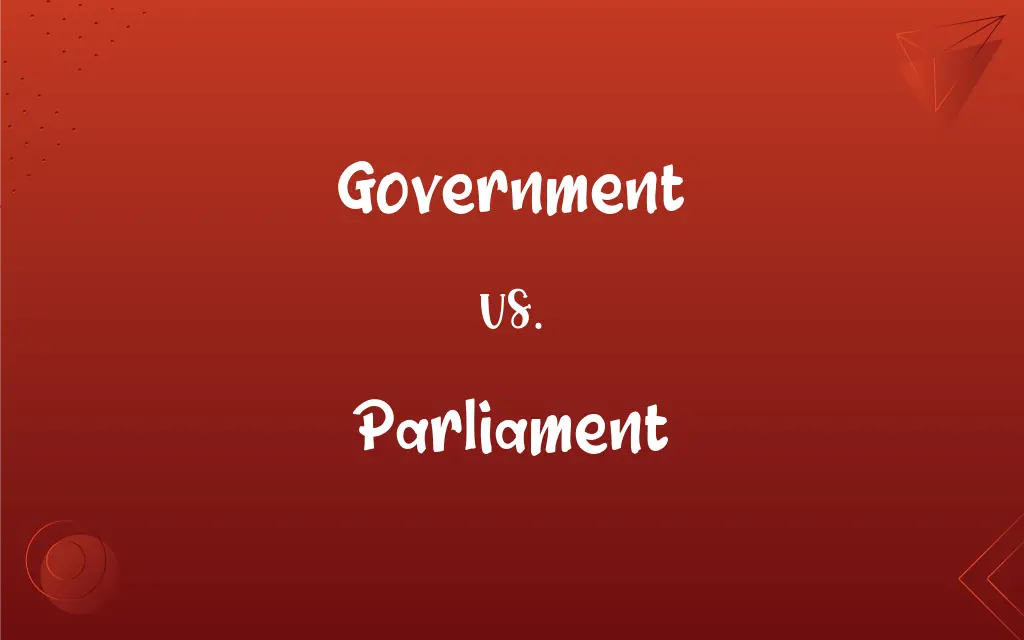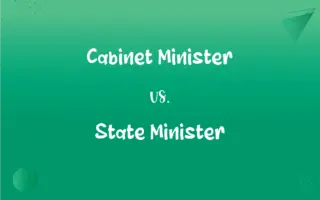Government vs. Parliament: What's the Difference?
Edited by Aimie Carlson || By Harlon Moss || Updated on October 16, 2023
Government is the ruling body or administration of a state; parliament is the legislative body in a parliamentary system.

Key Differences
Government encompasses the institutions, officials, and processes that make and implement decisions for a community or society. Parliament, on the other hand, is a specific legislative body that exists primarily in parliamentary democracies.
In the structure of a nation, the government can include multiple branches such as executive, legislative, and judicial. Parliament typically refers to the legislative branch where representatives are elected to make laws.
While the government has a broader role that includes enforcing laws, maintaining order, and protecting the nation, the parliament's primary function is to discuss, amend, and enact laws.
Members of the government might hold executive positions, manage departments, and have specific administrative roles. Members of the parliament, known as parliamentarians or MPs, participate in debates and vote on legislation.
Often, in a parliamentary system, the executive branch (the main part of the government) emerges from the majority party or coalition in the parliament. This illustrates the interconnected yet distinct roles of government and parliament.
ADVERTISEMENT
Comparison Chart
Definition
Ruling body or administration of a state
Legislative body in a parliamentary system
Main Roles
Implementing and enforcing laws
Making laws
Components
Can include executive, legislative, judicial
Primarily legislative representatives
Members
Can include president, ministers, officials
Parliamentarians or MPs
Relationship to Each Other
Can emerge from or be overseen by parliament
Can give rise to or oversee the government
ADVERTISEMENT
Government and Parliament Definitions
Government
The organization of officials directing a political unit.
The local government is handling the crisis efficiently.
Parliament
The period during which such an assembly is in session.
The parliament lasted for five years.
Government
The manner or system of rule.
A democratic government respects its citizens' rights.
Parliament
A formal conference for discussing public affairs.
The parliament addressed the nation's pressing issues.
Government
The group of individuals holding the authority to govern.
The current government was elected last year.
Parliament
The supreme legislative body in a parliamentary system.
The parliament will debate the bill next week.
Government
The body that governs a nation or state.
The government announced new tax reforms.
Parliament
An assembly of representatives elected by the public.
Members of parliament voiced their concerns.
Government
The act or process of governing.
The government of the city was exemplary.
Parliament
A conference or consultation.
The two groups had a parliament to discuss terms.
Government
The act or process of governing, especially the control and administration of public policy in a political unit.
Parliament
A representative body having supreme legislative powers within a state or multinational organization.
Government
The office, function, or authority of a governing individual or body.
Parliament
Parliament The national legislature of the United Kingdom, made up of the House of Lords and the House of Commons.
FAQs
What role does parliament play?
Parliament is the legislative body in a parliamentary system, responsible for making laws.
Can a government function without a parliament?
In some systems, yes, but in parliamentary democracies, the government emerges from parliament.
Who are members of a parliament called?
They are often called parliamentarians or MPs.
Who makes the laws in a parliamentary system?
The parliament, consisting of elected representatives, makes the laws.
What is a government?
A government is the ruling body or administration of a state or community.
Can members of the government be part of the parliament?
In parliamentary systems, often the executive branch or government officials are also members of the parliament.
What's the primary function of the government?
To implement and enforce laws, maintain order, and protect the nation.
How do the government and parliament interact?
They collaborate on legislation, with the government proposing laws and the parliament reviewing, amending, and passing them.
How does the government enforce laws?
Through its executive and judicial branches and various agencies.
What happens when there's conflict between government and parliament?
It varies by country, but can lead to political stalemates, elections, or changes in leadership.
Can the parliament remove members of the government?
In many parliamentary systems, yes, through processes like votes of no confidence.
Who is the representative of the state: the government or parliament?
the government in administration and execution, the parliament in legislation.
How often does the parliament meet?
It varies by country, but parliaments typically have regular sessions throughout the year.
Who oversees the actions of the government?
In many parliamentary systems, the parliament oversees the government's actions.
What's the relationship between government and parliament in a democracy?
In a parliamentary democracy, the government often emerges from the majority in the parliament and is accountable to it.
How are members of the parliament chosen?
They are typically elected by the public in democratic systems.
Why is the separation of powers important?
It ensures checks and balances, preventing any one branch (like government or parliament) from gaining too much power.
What's the difference between government officials and MPs?
Government officials hold administrative roles, while MPs are elected representatives in the parliament.
Who heads the government in a parliamentary system?
Often a prime minister, who is typically the leader of the majority party or coalition in the parliament.
Is the president part of the parliament?
No, the president is typically part of the executive branch, separate from the parliament.
About Author
Written by
Harlon MossHarlon is a seasoned quality moderator and accomplished content writer for Difference Wiki. An alumnus of the prestigious University of California, he earned his degree in Computer Science. Leveraging his academic background, Harlon brings a meticulous and informed perspective to his work, ensuring content accuracy and excellence.
Edited by
Aimie CarlsonAimie Carlson, holding a master's degree in English literature, is a fervent English language enthusiast. She lends her writing talents to Difference Wiki, a prominent website that specializes in comparisons, offering readers insightful analyses that both captivate and inform.































































